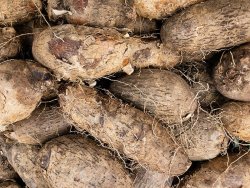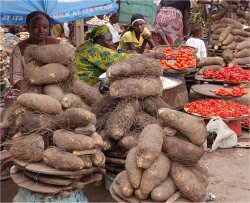
Contact usUnited CaribbeanFood For Life
Organic SuperFoodsOrganic SuperFruitsSwahili Food For Life CurriculumAlternative Animal FodderA.B.C.D |
home >> moringa
miracle tree>>food
for life africa>>yam Food for Life - Africa - Yam
Some major differences that set them apart from sweet potatoes:
Although yams are grown all over the African continent, Nigeria is the world’s largest producer and exporter, accounting for over 70 percent of the total global production. Health benefits of yams: Yam is a good source of energy; 100 g provides 118 calories. Its crunchy edible root is chiefly composed of complex carbohydrates and soluble dietary fiber. Dietary fiber help reduces constipation, decreases bad (LDL) cholesterol levels by binding to it in the intestines, and lowers colon cancer risk by preventing toxic compounds in the food from adhering to the colon mucosa. Additionally, being a good source of complex carbohydrates, it regulates a steady rise in blood sugar levels. For the same reason, yam recommended as a low glycemic index healthy food. The tuber is an excellent source of the B-complex group of vitamins. It provides adequate daily requirements of pyridoxine (vitamin B6), thiamin (vitamin B1), riboflavin, folates, pantothenic acid, and niacin. These vitamins mediate various metabolic functions in the body. Fresh root also contains good amounts of antioxidant vitamin, vitamin-C; providing about 29% of recommended levels per 100 g. Vitamin-C plays some important roles as anti-aging, immune function booster, wound healing, and bone growth. Yam contains small amounts of vitamin-A, and ß-carotene levels. Carotenes convert into vitamin-A inside the body. Both these compounds are powerful antioxidants. Vitamin-A has many functions like maintaining healthy mucosa and skin, night vision, growth, and protection from lung and oral cavity cancers. Further, the tuber indeed is one of the good sources of minerals such as copper, calcium, potassium, iron, manganese, and phosphorus. 100 g provides about 816 mg of Potassium. Potassium is an important component of cell and body fluids that helps controlling heart rate and blood pressure by countering the hypertensive effects of sodium. Copper is essential for the production of red blood cells. The body uses manganese as a co-factor for the antioxidant enzyme, superoxide dismutase. Iron is required for red blood cell formation. Information sourced from www.nutrition-and-you.com |
| GROW AND GO CURRICULUM
SOWING SEEDS OF SUCCESS - MORINGA CURRICULUM SUPER FRUIT CURRICULUM NEW LIFE CURRICULUM
|
| Copyright © 2024 www.UnitedCaribbean.com. All rights reserved. Disclaimer Click to Contact us |










































